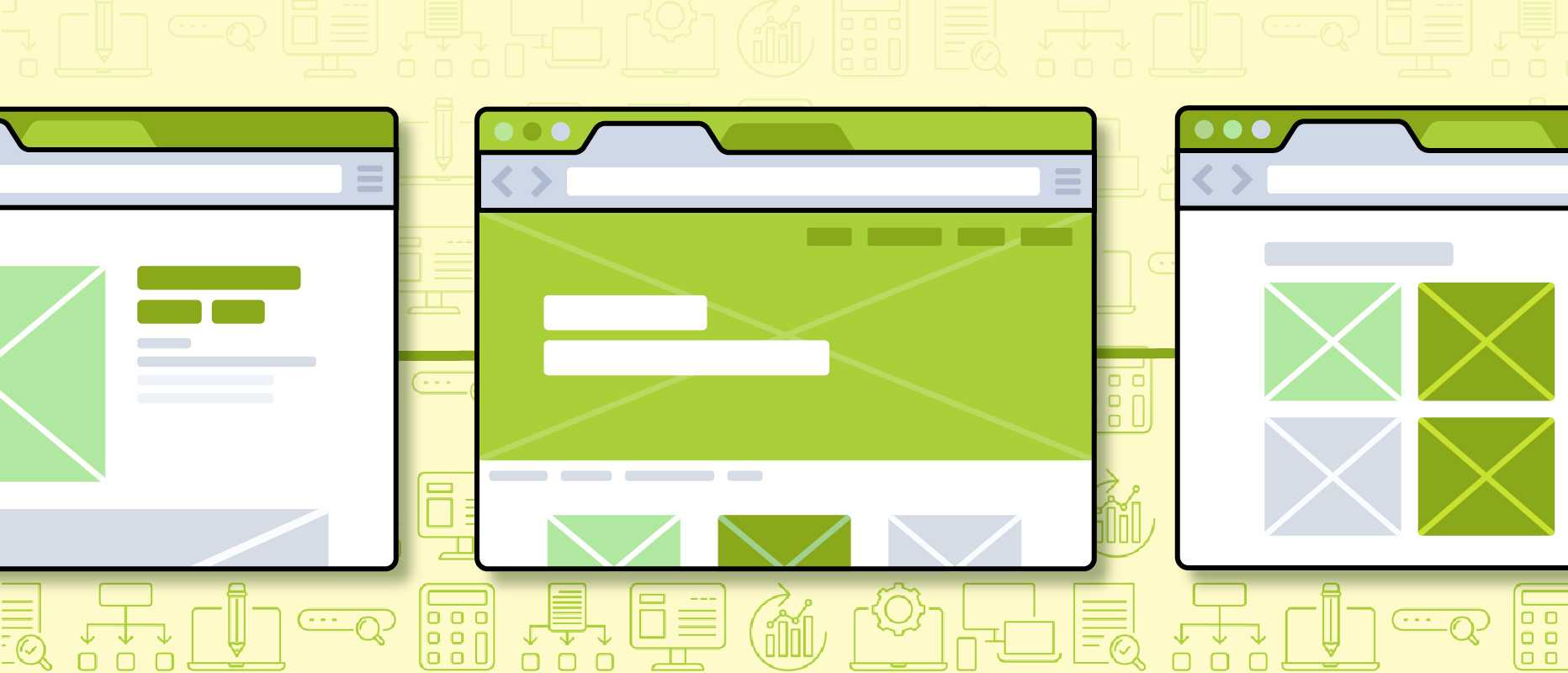So, it’s time to build a new or update your existing website. You can create a custom-built website specifically for you and your business, but you’ve also heard about pre-existing website templates to get your website up faster. What do you do?
While both methods have pros and cons, it’s important to understand if a website template would or would not work for your particular needs.
What is a Website Template?
First, let’s define what website templates are. A website template is a pre-designed webpage or series of webpage layouts where you can put in media and content, such as images, videos, and blog posts. You can then use the templates to create a website with as many webpages as needed and you can update the content whenever you want to.
If a web designer cannot be involved in creating your website, pre-built templates are an excellent option to save time and avoid making substantial design errors in the project. They’re also ideally suited for businesses whose websites require little to no coding or customization.
However, there are some risks in using templates that could seriously affect your business’s bottom line.
Template Benefits
They’re Fast to Get Up and Running
Templates can be a great time-saver. Instead of making a design from scratch, a template has the basic layout for a website with all design decisions made already. A user can then customize details such as colors and fonts to make the template to match their brand, allowing the website to go “live” on the web faster than a custom-designed website.
Perfect for Limited Budgets
Templates are, on the face, affordable substitutes for a custom-designed website. Theme developers will often create templates with the most common basic features, the most popular design trends, and a modern appearance and sell them at a low cost to the user. Because pre-built features are already in place, the amount of time needed to get a template website up and running can be shortened, thus saving a company the expense of spending hours on design and development.
Great for Smaller Projects
Although they may not be a long-term solution for a larger company, a template is a great starting point for an individual or smaller company trying to start and establish a web presence with a plan for updating to a more custom website in the future. Website templates can be an excellent solution for smaller website projects, landing pages, and personal blogging websites that need to be up quickly. They’re also great for temporary web pages and marketing campaigns with a scheduled ending date, as they don’t necessarily require a complex website build that lasts for months or years.
Useful for People who are NOT Web-Savvy
Most website templates need little-to-no coding to make most of their features work with some (although limited) creative flexibility for customization. People who need a website up fast but can’t afford a developer or don’t have the know-how to develop a website themselves find this useful. Most templates have an easy-to-navigate content management system (CMS) that would allow anyone to update basic fonts, colors, and content. And the majority of today’s website templates are mobile responsive, so they’ll look and function well on all digital devices without additional development.
Template Disadvantages
Limited Customization and Growth
Website templates can only be customized with basic changes such as colors, fonts, and content. Otherwise, most templates cannot handle changes in functionality or responsiveness without extensive developer coding help. If your company is growing, a templated website would most likely not be able to grow with it.
The “One-Fits-All” Look
There’s little to no room for creativity when it comes to templates. Website templates have a simple framework that can appeal to most people, and anyone can use them, which allows the template to provide basic functionality quickly and cheaply. However, you’re also pretty limited to what the template’s design will let you do.
On top of that, there’s no guarantee that other companies are not using the same website template. As similar designs sell across numerous website template marketplace sites, they are heavily overused, making them look and feel less professional. As a result, your website can have a hard time standing out from the crowd without significant customization.
Questionable Code and Security
The website template might look great in the demo but it could contain major development flaws once purchased. These flaws are sometimes due to the speed at which it was developed. Depending on where you bought the website template, it could also be hiding malicious code. Major template marketplaces like ThemeForest and WordPress and template builders like Squarespace have a strict review process for the templates they sell. Still, free website template sellers are notorious for being an enormous online security risk.
Website templates are also at the mercy of the developer to make security and theme updates to keep up with the ever-increasing need for online security. If they are slow to update or don’t keep it up, it can hamper website performance, which can ruin credibility. Worse, it can break the website template and leave your website vulnerable to hacking and other security issues.
And fixing a broken or hacked website after the fact isn’t a cheap fix. Many developers won’t even touch a website template due to the time, cost and headaches of trying to understand and alter the code. You could be spending more money to repair security problems on a website template than you would if you built a customized website from the very beginning.
Almost No SEO Support
Search engines like Google use algorithms that crawl your website’s code and score it to help determine the value of the website and its relevancy in search. This scoring process is called SEO or Search Engine Optimization, and it is critical to a company’s success in being found online. Therefore, your website’s code needs to have all the techniques and best practices to rank high in search engines.
Website templates tend to have generic features, making them visually appealing but not great for search results. Most website templates are coded quickly to sell at a lower price point. Often, several relevant parts were probably disregarded – including SEO. Without it, your website becomes a needle in a haystack to your potential customers, no matter how good it looks. So even though that website template was cheap to create and update, you’ll be paying much more out-of-pocket costs to make sure it ranks on Google.
Should You Use a Website Template?
Sometimes, a pre-made website template makes sense, and in some cases, it might be the recommended route to your temporary web presence. First, however, it’s essential to understand all the drawbacks (both present and future) of using a website template. For example, while you might be saving on cost and time in the short term, a website template might not be able to grow with you or your business in the future, might pose security risks, or cost more to maintain or replace.
Here are some questions you would need to ask:
- Are you a small company or individual with a limited budget?
- Would you be able to, or are you capable of spending the time to update your website?
- Are the features you want for your website pretty basic?
- Are you willing to stay within the limited customization available on a template?
- Will your business and/or profitability be adversely affected if there’s a problem with the template (security, inability to update, site downtime)?
- Is SEO (your website’s visibility in online search) important to you?
Download our handy flowchart to find out if a website template is right for you!

